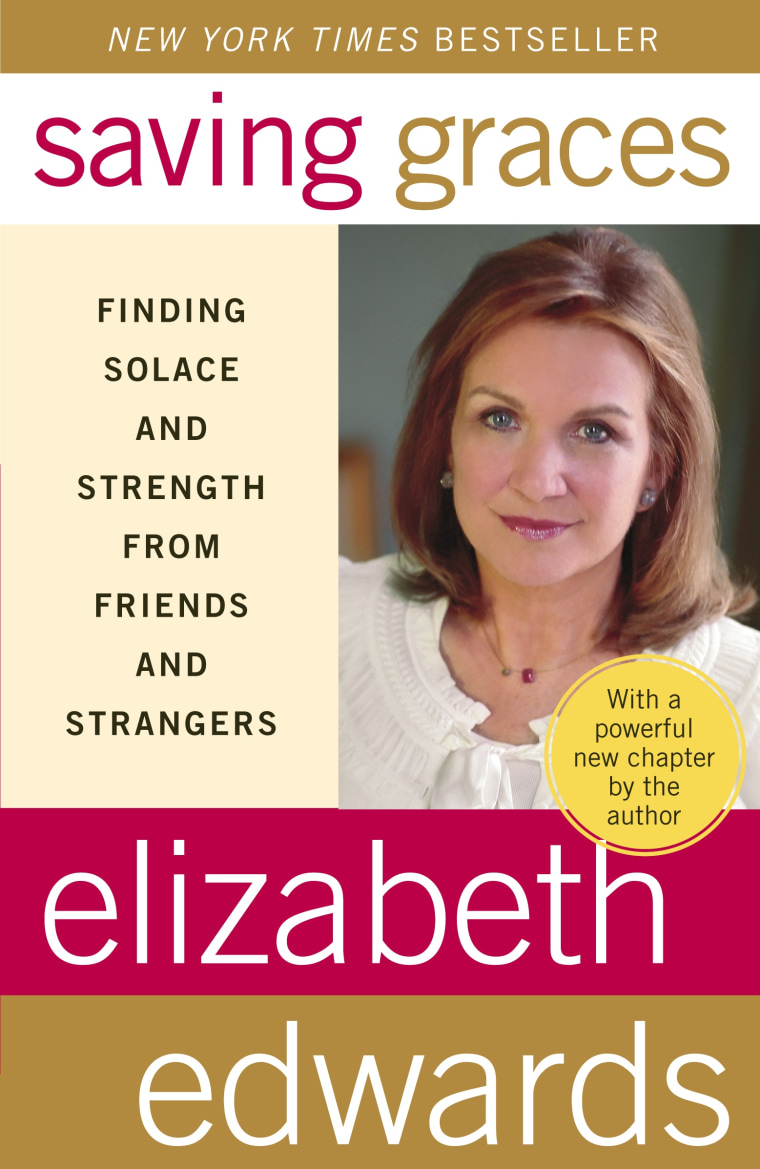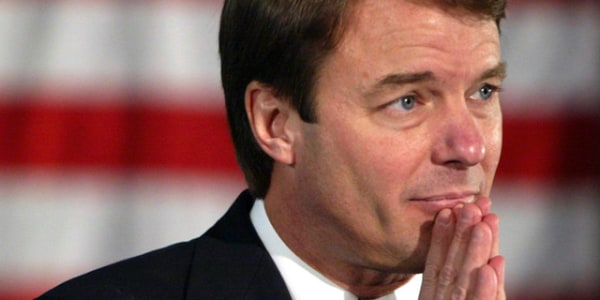America warmed to Elizabeth Edward and her affable, down-to-earth personality as she campaigned for her husband, John Edwards, for vice president. She inspired millions as she valiantly fought advanced breast cancer, which was diagnosed just days before the 2004 election. She shares the experiences, and the death of a 16-year-old son in 1996, in a new memoir. Here's an excerpt:
HOME, FROM A NEW ANGLE
This was meant to be a very different chapter. The beginning of our new lives, filled with pastures in which the dogs could chase deer before they reached the flower beds, packed with afternoons exploring the woods with the children, and filled with evenings together at our long kitchen table.
There would be stories of the next campaign, of course, and of the friends with whom we have reconnected here and across the country. That was what I had hoped to write. And then I broke my rib, and somewhere a snowball fell on an embankment and rolled and rolled until an avalanche took away the thoughts of any truly carefree days for me or for those who love me.
And so I write this chapter instead. You have to forgive me that, although so many have reached out to me and deserve to be here, this chapter is a tribute mostly to those closest to me: those with the most to lose from the most recent diagnosis that the breast cancer has spread to my bones and is now classified as incurable.
John and I sat in the car watching Jack’s baseball practice. John first sat in the bleachers, but when the sun set, a cold April night had replaced the warm April day, so now we sat together in the semi-warmth of the car facing the field and watching seven- and eight-year-olds practice punching their fists into their gloves and leaning forward onto the toes of their new cleats, their elbows resting on their knees, waiting for the next ground ball.
Coach Mitch, the model of the dedicated and serious parent-coach, was throwing the grounders, cheering them on when they handled one, reassuring them when it sped between their legs to the greening grass of the outfield. In one rotation, Jack was playing left field, or rather he was standing at the edge of left field, kicking up dirt and watching the wind carry it. I remembered him doing the same thing last year when Coach Mitch coached Emma Claire and Jack. Jack would be kicking dirt in left field and Emma Claire would be looking for four-leaf clovers in center. I would call out from the bleachers: Baseball. Just one word. Just a reminder about why we were there. I rolled down the window and did it again now for Jack. Baseball. Sometimes we all need reminders when we are distracted from the task in front of us.
Slideshow 30 photos
John Edwards' public life
It was just the previous week that John and I were the ones kicking dirt, trying to put ourselves anywhere except where we were, which was in a small room at UNC Hospital, waiting, huddled, for a bone scan. But that was where we were, waiting for the inevitable crush of bad news from my doctors.
And could it only have been a week before that when John had come home from campaigning and all seemed so well? It had been late when I heard him come in, but I awoke. I lay in bed listening to the sounds to which I have become accustomed over the last thirty years, the sound of his unpacking his bag in the closet, stepping into the shower to rinse off the day, brushing his teeth, padding down the hall to kiss the sleeping children good night. I love those sounds, the comfortable predictability that comes with a long history. Honestly, sometimes I awake as he comes in but fall back asleep before he finishes his ritual. But not tonight. Tonight I turned toward him when he climbed into bed and reached across for me. Long day? Yes, he answered, how’s your back? I had pulled a muscle in my back the day before, lifting a chest of drawers from behind a row of cardboard boxes in the storage room. I knew better: you lift with your legs not your back, but when you lean to lift— as I had to over the row of boxes in the storage room—you are always using your back. I had felt the pull as soon as I lifted.
Stupid me, I had thought. Why had I been so impatient? I should have waited for John to come home, but I had tired of seeing a lamp in the corner on the floor where I planned to have a lamp in the corner on a chest, so I had gone ahead alone. I remember moving into the house last summer. John was traveling, and I had wanted everything to look perfect when he came to the house for the first time. I put away thousands of books, unrolled rugs, made beds, unwrapped and washed dishes. And pulled a muscle in my back.
But it was worth it to see his face, get his kiss, when he came in to a house that was the colored-in picture of the house I had carried in my head for months, the picture I had described to him for just as long. The pulled muscle then was uncomfortable but worth it. And now, I suppose, I had done the same thing, on a smaller scale.
It’s not too bad, I lied, as he moved toward the warmth on my side of the bed. He laid his head on my shoulder and reached his arm over me to pull me close. As he pulled, I felt a bolt of pain up my back and twisted quickly under his embrace. And then he heard it: a pop, or a crack. A crack, we now know. The next day, Dr. Lee, who had been treating my back, sent me for an X-ray. The rib might be broken. And the following day, he called with the results. A rib on my left side was cracked, he said matter-of-factly. But the X-ray showed something suspicious on the other side, and he wanted me to get a bone scan. I hung up after scheduling the scan, but the thought was already gnawing in my head: what was he looking for? I had promised myself when I was fighting breast cancer two years before that I wouldn’t Google any more medical conditions. But I broke that promise to myself. And, again, no good came of it. I called Dr. Lee’s frank, smart nurse Ursula and told her what I had found online. They must be looking for cancer. He called right back. I am worried, I told him. He was honest, which I wanted, but his simple words were a dagger: I am worried, too.

John came immediately when I called, even though he was on his way to Indianola, Iowa. I said, “I need you.” It was all I had to say. He cancelled an evening campaign event and came back to North Carolina. I have e-mailed with the Iowa family in whose home he was supposed to have had a house party that night, and who had undoubtedly cleaned and prepared snacks for the friends and neighbors who were gathering to listen, preparing to decide— maybe in March—for whom they would caucus for president almost ten months later. The Waltons wouldn’t accept my apologies; he was where he should be, they said. I couldn’t really disagree. That night, back in North Carolina, John held me sweetly, tenderly, as we each lay awake, each pretending to sleep, each waiting for the morning sun to fill the room, waiting to go to the hospital, waiting to hear the words that were already playing on a loop inside our heads. The cancer is back, the cancer is back, the cancer is back.
Making breakfast for Emma Claire and Jack, packing their lunches, driving them to school, we forced ourselves to stop the loop, to concentrate on the children and the usual morning rituals. Baseball. This was the most compelling diversion we could imagine. They had climbed out of the car, loaded their backpacks on their backs and, as they always do, stood together on the sidewalk waving good-bye until we drove around the circle and headed out. As soon as we waved and drove on, the loop started again.
Now we were alone in the small examining room. I’d had an injection that would travel through my bones and illuminate the “hot spots” where cancer might be lurking, and now we sat waiting for the scan itself. A woman on the elevator spoke to me about this book, and I let myself lean into her words about what it had meant to her. I leaned into her words, and into the book and thoughts of all that had happened in the last six months.
For a few minutes more, I could be the woman who had won her battle with cancer and lived to write about it. I said hello to Baseball and let myself fall into the memory of those halcyon days.
Copyright © 2007 by Elizabeth Edwards. Excerpted by permission of Broadway Books, a division of Random House, Inc. All rights reserved. No part of this excerpt may be reproduced or reprinted without permission in writing from the publisher.”
